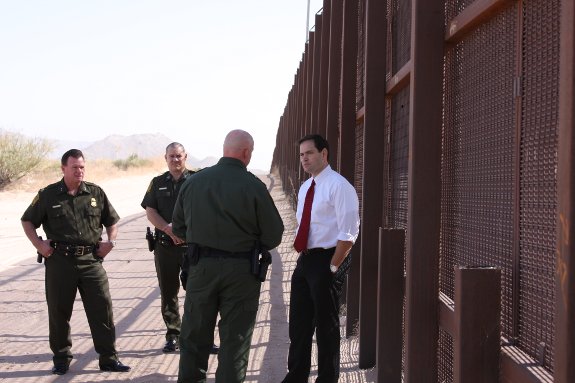
U.S. Sen. Marco Rubio tours the fence along the U.S.-Mexico border. Rubio's tough stance on immigration has made him a conservative darling -- but has put him at odds with the Latino community. (Photo courtesy of Marco Rubio.)
By Howard Goodman
Florida Center for Investigative Reporting
This looks like U.S. Sen. Marco Rubio’s moment in the sun.
The movement-conservative darling — and possibly the first Latino to gain a spot on a party’s national presidential ticket — is the subject of a Time magazine cover story.
Time has a lengthy interview with the Cuban-American senator from Miami, in which he argues that the GOP needs a more positive message on immigration.
His remarks appear to be a well-timed effort by Rubio to build support in the Latino community, most of whose members have responded to his positions on illegal immigration with something like revulsion. For example, 91 percent of Latinos support the Dream Act, which would allow undocumented young people to attend college — but not Rubio.
The attention comes on the heels of a widely reported poll of GOP and independent voters, showing that Rubio holds a slight edge as their favorite pick for vice president nominee, regardless of who is the Republican nominee for president. The poll by Fairleigh Dickinson University found Rubio in the top spot with 8 percent, followed by former Pennsylvania Sen. Rick Santorum with 7 percent and New Jersey Gov. Chris Christie with 6 percent.
Rubio has been riding an extraordinary wave of publicity on that 8 percent. This is a poll in which “Don’t know” got 44 percent.
The flurry of Marco-mania got a big boost from his boffo appearance earlier this month at CPAC, the Conservative Political Action Convention. Rubio’s rousing oration was the hit of the gathering.
Rubio’s speaking skills, youthful looks and upbeat message of conservative American values are just part of his attractiveness to Republicans dying to retake the White House. On top of it is the elusive GOP hope of capturing a healthy share of the fast-growing Hispanic vote. Remember when George W. Bush, as a Texas governor seeking the presidency in 2000, campaigned for an even-handed immigration policy?
That tone is long forgotten in this primary season, The GOP presidential candidates have been competing to see who can stake the most hawkish positions: lots of talk about border fences and deportations, ritual references to “illegals” and “illegal aliens,” rather than “undocumented workers.”
And as the International Business Times reminds us: “Texas Gov. Rick Perry was attacked on all sides for defending a bill that gave in-state tuition to undocumented immigrant students in Texas, contributing to the Perry campaign’s demise.”
But Rubio’s ethnicity may not hold the power to draw in the Hispanic vote that one might assume. Although he’s popular with Cuban-Americans, his views are far to the right of most other Latinos. Ken Auletta, The New Yorker‘s media reporter, examined these tensions at length in a recent story about Rubio’s war with Univision, the nation’s largest Spanish-language media outlet, based in Miami.
Auletta wrote:
It is perilous to maintain positions on immigration that anger the majority of Hispanics. Because Rubio comes from the small Cuban community, whose members have long been granted automatic citizenship — as political exiles, not as immigrants — he risks being perceived by Hispanics as an out-of-touch élitist. Earlier this year, the conservative columnist Ruben Navarrette wrote on CNN.com about the political dilemma faced by Rubio and his party: “Marco Rubio is the Republican Party’s Superman. And the immigration issue, if not handled correctly, is his kryptonite.”
With more than 21.7 million Latinos eligible to vote in this year’s presidential election, a jump from 19.5 million in 2008 — and three times as many as in 1988 (7.7 million) — these votes could be pivotal. “Republican strategists today think that their candidate can’t win without receiving at least thirty-five percent of the Hispanic vote — as George W. Bush did in 2000 and 2004, but as John McCain did not in 2008,” Auletta wrote.
McCain got just 31 percent of the Hispanic vote in 2008 to President Obama’s 67 per cent.
Currently, the Democrats’ advantage looks even bigger. As Time writes:
In a recent Latino Decisions poll conducted for Univision, 72% of Latinos said the GOP either did not care about their support or was hostile to their community. The 27% who sensed hostility represented a seven point increase from April of 2011, when the same pollsters asked the question. “Conservatives have not realized how their tone and rhetoric has turned people off,” says Jennifer Korn, who led George W. Bush’s Latino outreach effort in 2004.
